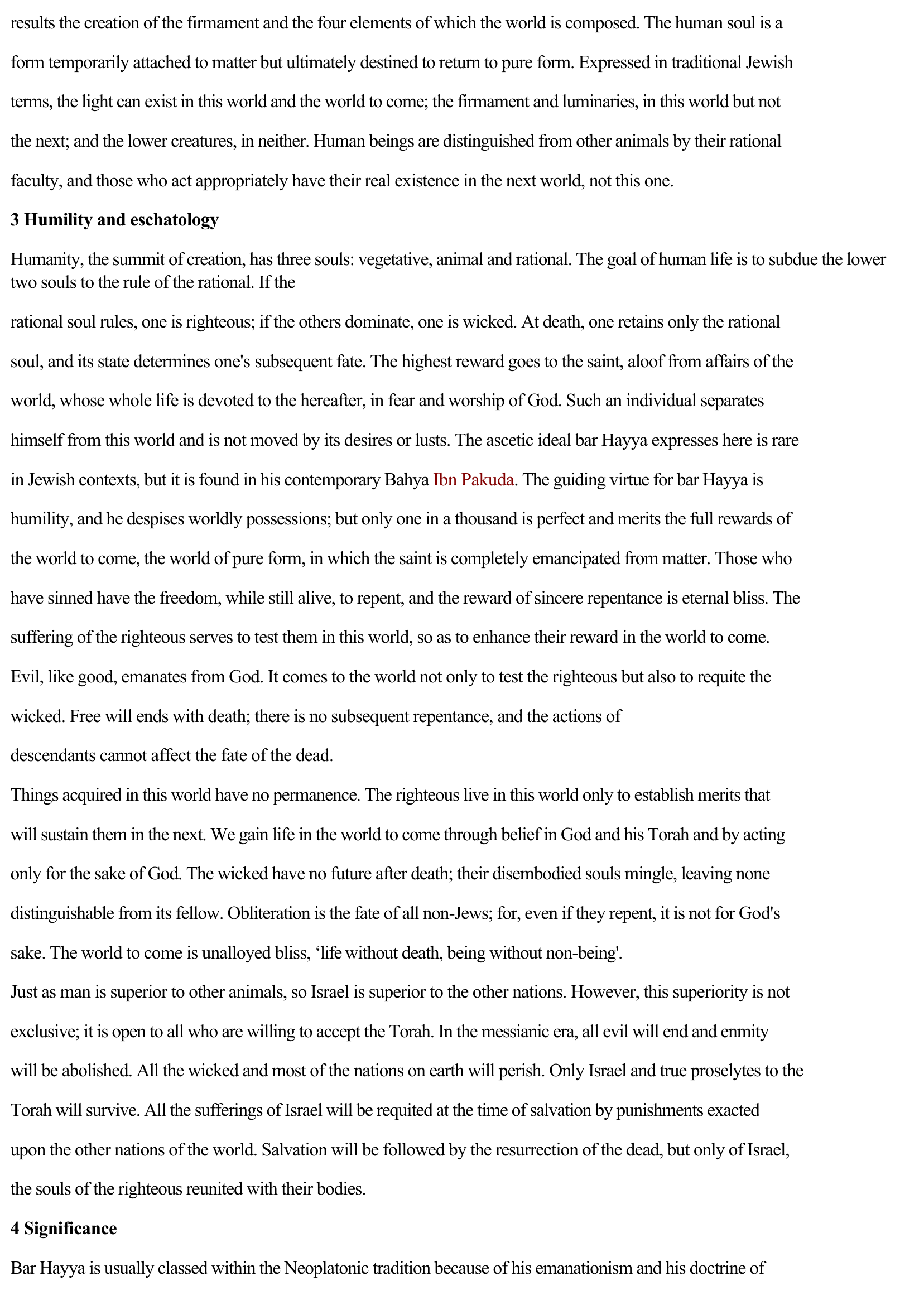Bar Hayya, Abraham
Publié le 22/02/2012

Extrait du document
«
results the creation of the firmament and the four elements of which the world is composed.
The human soul is a
form temporarily attached to matter but ultimately destined to return to pure form.
Expressed in traditional Jewish
terms, the light can exist in this world and the world to come; the firmament and luminaries, in this world but not
the next; and the lower creatures, in neither.
Human beings are distinguished from other animals by their rational
faculty, and those who act appropriately have their real existence in the next world, not this one.
3 Humility and eschatology
Humanity, the summit of creation, has three souls: vegetative, animal and rational.
The goal of human life is to subdue the lowertwo souls to the rule of the rational.
If the
rational soul rules, one is righteous; if the others dominate, one is wicked.
At death, one retains only the rational
soul, and its state determines one's subsequent fate.
The highest reward goes to the saint, aloof from affairs of the
world, whose whole life is devoted to the hereafter, in fear and worship of God.
Such an individual separates
himself from this world and is not moved by its desires or lusts.
The ascetic ideal bar Hayya expresses here is rare
in Jewish contexts, but it is found in his contemporary Bahya Ibn Pakuda .
The guiding virtue for bar Hayya is
humility, and he despises worldly possessions; but only one in a thousand is perfect and merits the full rewards of
the world to come, the world of pure form, in which the saint is completely emancipated from matter.
Those who
have sinned have the freedom, while still alive, to repent, and the reward of sincere repentance is eternal bliss.
The
suffering of the righteous serves to test them in this world, so as to enhance their reward in the world to come.
Evil, like good, emanates from God.
It comes to the world not only to test the righteous but also to requite the
wicked.
Free will ends with death; there is no subsequent repentance, and the actions of
descendants cannot affect the fate of the dead.
Things acquired in this world have no permanence.
The righteous live in this world only to establish merits that
will sustain them in the next.
We gain life in the world to come through belief in God and his Torah and by acting
only for the sake of God.
The wicked have no future after death; their disembodied souls mingle, leaving none
distinguishable from its fellow.
Obliteration is the fate of all non-Jews; for, even if they repent, it is not for God's
sake.
The world to come is unalloyed bliss, ‘life without death, being without non- being' .
Just as man is superior to other animals, so Israel is superior to the other nations.
However, this superiority is not
exclusive; it is open to all who are willing to accept the Torah.
In the messianic era, all evil will end and enmity
will be abolished.
All the wicked and most of the nations on earth will perish.
Only Israel and true proselytes to the
Torah will survive.
All the sufferings of Israel will be requited at the time of salvation by punishments exacted
upon the other nations of the world.
Salvation will be followed by the resurrection of the dead, but only of Israel,
the souls of the righteous reunited with their bodies.
4 Significance
Bar Hayya is usually classed within the Neoplatonic tradition because of his emanationism and his doctrine of.
»
↓↓↓ APERÇU DU DOCUMENT ↓↓↓
Liens utiles
- Abraham, Karl - psychologie & psychanalyse.
- Abraham Sacrifiant de Bèze (résumé)
- ARMURIER (L') (résumé & analyse) Abraham Viktor Rydberg
- Abraham, OEuvres complètes (extrait) Disciple de Freud dont il est très
- Abraham SACRIFIANT de Théodore de Bèze (fiche de lecture)

































